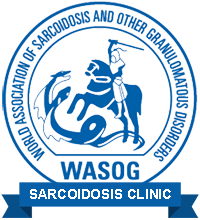Efficacy and safety of TNF antagonists in ocular sarcoidosis: data from the French registry STAT
Keywords:
efficacy, safety, sarcoidosis, TNF antagonists, uveitisAbstract
Backgroung: This study investigated the efficacy and safety of TNF antagonists in sarcoid uveitis in unselected cases. Design: This is a multicentre study on patients with sarcoidosis who received TNF antagonists in pneumology and internal medicine departments in France. We present here the subgroup of patients with biopsy-proven sarcoid uveitis included in the nationwide registry STAT (Sarcoidosis treated with TNF AnTagonists). Results: Among the 132 patients included in this multicenter study, 18 patients with refractory uveitis were treated as a first-line TNF antagonist with infliximab (n=14), adalimumab (n=3) and certolizumab (n=1). Before anti-TNF initiation, the median duration of sarcoidosis was 42 months and 83% of the patients have been treated with at least one immunosuppressive drug. Six patients switched for a second-line TNF antagonist. After a mean time under treatment of 29 months, the treatment resulted in a significant decrease of the ophthalmic extrapulmonary Physician Organ Severity Tool (ePOST) (mean score: 4.2 vs. 2.6) scores and a steroid sparing effect (29.4±20.7 vs. 6.2±5.2 mg/d). Overall, the ophthalmic response, either complete or partial, was 67%. Nine patients (50%) presented adverse events, including severe infectious complications in 5 patients, which required anti-TNF treatment interruption in 6 cases (33%). Among the 7 responder patients who discontinued anti-TNF therapy, 71% relapsed. Finally, 12 patients (67%) could continue TNF antagonist treatment. Conclusions: TNF antagonists were efficient in 67% of biopsy-proven refractory sarcoid uveitis. Severe adverse events, mainly infectious complications, were frequent. The high frequency of relapses after anti-TNF-α discontinuation requires a close patient follow-up thereafter.
Downloads
Published
Issue
Section
License
This is an Open Access article distributed under the terms of the Creative Commons Attribution License (https://creativecommons.org/licenses/by-nc/4.0) which permits unrestricted use, distribution, and reproduction in any medium, provided the original work is properly cited.
Transfer of Copyright and Permission to Reproduce Parts of Published Papers.
Authors retain the copyright for their published work. No formal permission will be required to reproduce parts (tables or illustrations) of published papers, provided the source is quoted appropriately and reproduction has no commercial intent. Reproductions with commercial intent will require written permission and payment of royalties.

This work is licensed under a Creative Commons Attribution-NonCommercial 4.0 International License.








